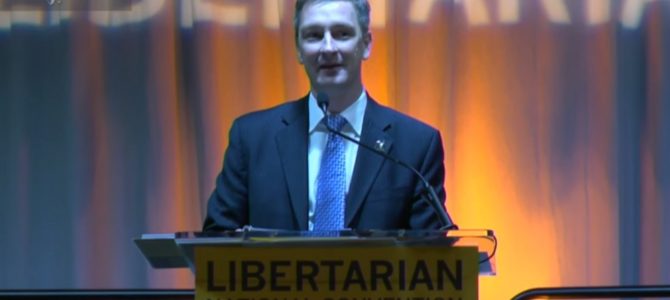
Although you can see the SuperDome just next door from the glass elevators in the Hyatt Regency, the convention hotel hosting the Libertarian Party’s national convention this Fourth of July weekend in New Orleans, NBC’s Brian Williams is not here covering any notables who might float by.
No other major media are here either, although the delegates’ convention bags all have the C-SPAN logo emblazoned on one side. C-SPAN covered their infamous 2016 convention in Orlando, where the Libertarians nominated former New Mexico governor Gary Johnson for president, and a portly Libertarian delegate from Michigan rushed the stage nearly naked to protest that decision.
If C-SPAN was coming this time, they changed their minds. Presidential tweeting and Democrat members of Congress at coast-to-coast rallies for open borders have distracted all media attention from the possibility of filming more libertarian ultra-transparency.
More than 1,000 are in attendance, including more than 680 delegates, in workshops about how to raise funds and elect local office holders, and in convention voting on a new chair and national committee. No candidates are being nominated until next year’s convention (in Austin, Texas), although former Republican Massachusetts governor William Weld is here speaking and schmoozing. He’s the early frontrunner for the Libertarian nomination in 2020.
Former Democratic Rep. Cynthia McKinney, who left Congress then ran as a Green Party presidential candidate, is also here speaking on how Libertarians can do more outreach to black voters. She argues Democrats have neglected these voters, quoting 2016 candidate Donald Trump, “What do you have to lose?”
Most of the speakers here are not well-known celebrities, but nuts and bolts activists like the perpetually cheerful national executive director of the Libertarian Party, Wes Benedict, or even organizers who are ideological small “l” libertarians but usually work professionally for major-party candidates or for nonpartisan campaigns, like Americans for Prosperity organizer Matthew Colter Hurtt.
The absence of media coverage is so complete that Libertarians not at the convention are dependent on a live stream of the main hall from YouTube. Matt Welch, an editor of the libertarian magazine Reason (who moderated some panels but has not yet covered the convention) promises wrap-up coverage after the convention ends. Reason plus two smaller Washington D.C. news outfits—71Republic and News2Share—that specialize in coverage of protests and political conventions are the only media presence here.
Libertarian delegates are spending the convention on debates between and voting on a half dozen people running for national chair of the Libertarian National Committee and another half dozen running for the vice chair position. Weld will continue to endorse local Libertarian candidates he likes and solicit their support, including Larry Sharpe, the 2018 Libertarian New York gubernatorial candidate who has raised more money and is running a more serious campaign than the Republicans are in New York.
While watching Weld escort Sharpe about the convention, it is easy to predict that Weld could be asking Sharpe, who is African-American, to be his vice presidential running mate, especially if his New York race shows well in November. Weld and the rest of the LP are hoping that the increase in registered Libertarian voters, donor lists, states with permanent ballot access, and elected state delegates who switched party registrations will allow them to continue to grow in 2020.
There is almost no formal discussion of the almost literal elephant in the room: namely how to run against Trump. If you already have an “outsider,” “disruptive” president who is cutting taxes, deregulating, considering Pentagon base closings, having unprecedented peace talks, appointing libertarian-leaning judges from Federalist Society lists, and possibly returning marijuana policy to the states, it is unclear what the Libertarians can do to run against him.
They could talk about tariffs or freer immigration, but several Libertarian candidates for federal office here admit off the record that it is hard for them to distinguish themselves from Trump in a broad sense, other than saying that they are more principled about it.
In some jurisdictions, Libertarian candidates like attractive Yale-educated Seattle lawyer Matt Dubin will run for state and local offices against extreme local policies, often implemented by Democrats, that have nothing to do with Trump. But nationally Libertarians may have been shunted by Trump’s successes into adopting as a slogan: “Peace, prosperity, a growing GDP, falling unemployment. Imagine if you had elected an actual Libertarian!”









